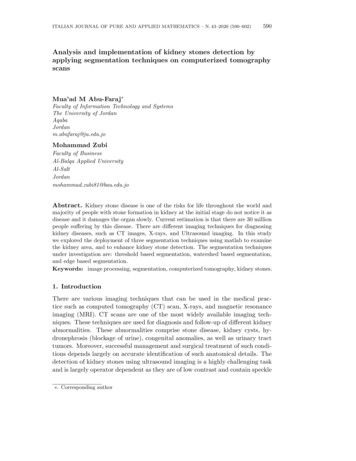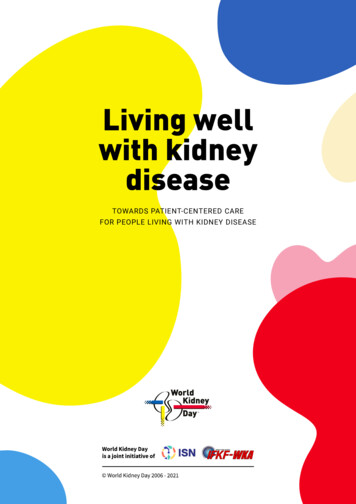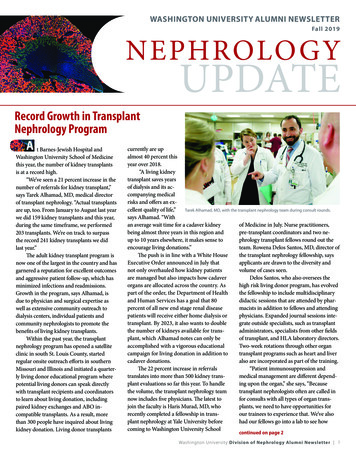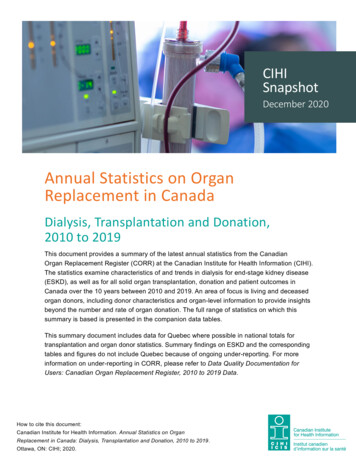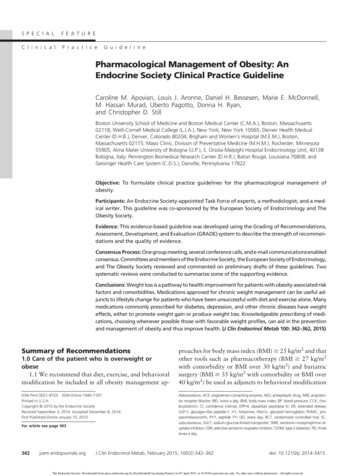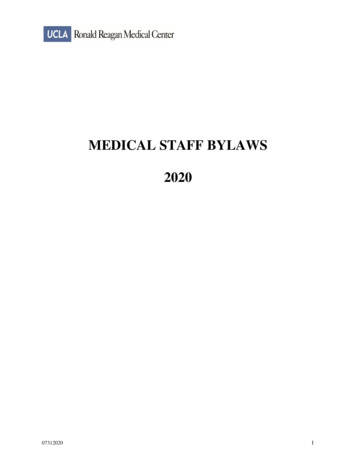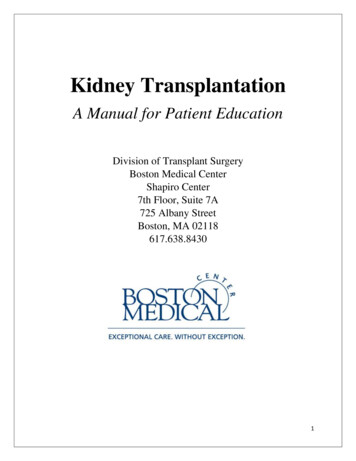
Transcription
Kidney TransplantationA Manual for Patient EducationDivision of Transplant SurgeryBoston Medical CenterShapiro Center7th Floor, Suite 7A725 Albany StreetBoston, MA 02118617.638.84301
The KidneysWhat are the kidneys?The kidneys are the master chemists of the body. Normally you have two kidneys: one on either side ofyour spine under your lower ribs. They are pink and shaped like kidney beans. Each kidney is about thesize of a closed fist.Why are the kidneys important?Kidneys remove wastes from the blood and excrete them into the urine. Your kidneys also regulatecertain electrolytes such as sodium and chloride, which are responsible for fluid balance; potassium,which is vital to your heart activity; and calcium and phosphorous, which are necessary for healthy bonesand muscles. Your kidneys also produce hormones that assist with the production of red blood cells andthe regulation of blood pressure. Many other organs depend on the kidneys in order to work properly.What is renal disease and why do I need treatment?Another name for kidney disease is renal disease. You can be healthy with one kidney. Renal diseaseusually affects both kidneys at the same time. When both kidneys do not work, waste materials and waterstay in your body. Your body’s chemical balance becomes upset. You become ill and need treatment todo the work your kidneys can no longer do. End-stage renal disease, or ESRD, means that you must havesome form of dialysis treatment or a kidney transplant in order to stay alive. Kidney transplantation iscurrently the best way to restore renal function and is recommended for most individuals.What is a kidney transplant?A kidney transplant is a surgical procedure in which a healthy kidney from either a living or deceaseddonor is placed in your lower abdomen. It is not a cure, but a treatment for chronic kidney failure. It is thetreatment of choice for those who are considered suitable candidates for a transplant.How does transplantation compare to dialysis treatment?Transplantation has many advantages. It can treat your kidney failure, improve your health, and provide alifestyle free from dialysis. Usually, you will have fewer fluid and diet restrictions after getting a “newkidney.” Most people even feel well enough to return to work or school.With transplantation comes responsibilities. For your new kidney to work, you must take medicationsevery day, exactly as taught, for as long as the kidney is working, and perhaps for your whole life. Thesemedications can have side effects. Complications may arise, such as rejection of your new kidney or aninfection. Each patient responds differently and each patient is unique.2
Candidate EvaluationGenerally, to be eligible, you must be less than 80 years old. Any other medical problems you have mustbe well controlled. You will need to meet with the transplant team, including the transplant surgeon,transplant nephrologist, nurse coordinator, dietician, pharmacist, social worker, and financial coordinator.The surgeon will examine you to determine if you have any medical or surgical reasons why kidneytransplant would not be appropriate. He will discuss the surgery itself, determine what additional testsneed to be done and address any questions or concerns you and your family may have. The coordinatorwill set up the appointments and explain any additional tests the doctor may have ordered and alsoexplain what takes place in the hospital when the transplant actually occurs. The social worker willaddress any emotional or financial concerns you may have. The Transplant Nephrologist works closelywith the surgeon in completing the medical evaluation.All candidates must undergo extensive testing before transplantation. The blood tests include bloodgrouping, kidney function, liver function, and viral studies such as hepatitis and HIV. Tissue typing is thedetermination of specific proteins that are on the cell surface. These proteins are called antigens. Allpeople receive three antigens from their father and three from their mother. This test will allow us tobetter match a kidney to you.Other routine tests are urine tests, chest x-ray, TB test, EKG and echocardiogram. You will also need tosee a Cardiologist and Psychiatrist.You must identify a Care partner/Support Person who will help you through the surgery and initialrecovery. This Support Person will need to come to all of your evaluation appointments to learn what thisrole involves and ask questions as they come up. You must have stable, secure housing, transportation tothe Transplant Center for follow up care, and insurance to cover the surgery and costs of yourmedications.Once all the test results are reviewed by our Transplant Committee and the team has cleared you for atransplant, you will be placed on the active waiting list. To remain active you must send a blood sample tothe organ bank each month. This is usually coordinated through your dialysis center or nephrologist.Transplant Team Members A Transplant Surgeon will conduct an evaluation, from a surgical standpoint, to ensure that youremain an acceptable candidate while you are on the list at BMC. The surgeon is available todiscuss your case with your nephrologists should the need arise.A Transplant Nephrologist will conduct an evaluation, to ensure that you remain medicallysuitable to receive a transplant at BMC. The Transplant Nephrologist is available to discuss yourcase with your nephrologists should the need arise.The Transplant Coordinator provides reinforced education regarding the transplant process,listing for transplant and patient responsibilities before and after transplant. The coordinator isyour advocate throughout the transplant process and will work with you to ensure all your needsare met. This coordinator is your contact person here at BMC and a resource for you. Thecoordinator is responsible for ensuring you fully understand the transplant process and yourresponsibilities in partnering with BMC for your continued care.A Psychiatrist and Social Worker are available to you throughout the waiting period and willmeet with you to evaluate your ability to cope with the stress of transplantation and your ability to3
follow a rigorous treatment plan, both before and after transplantation and address any additionalconcerns that may arise while you await your transplant.A Dietitian will evaluate you while you are on the wait list to ensure your nutritional statusremains optimal for transplant. The dietitian is also available to you at any time while you waitfor transplant.A Pharmacist will also evaluate your current med list and identify any possible drug-druginteractions that may occur after transplant and they will make recommendations to either avoidthe interactions or decrease the potential side effects. The pharmacist will also teach you aboutyour medications, why you need to take them, and assess compliance with your medicationregimen.A Transplant Financial Coordinator will meet with you to discuss your insurance coverage andadvise if there are additional coverages you may be eligible for.You may be required to see other specialists during your evaluation and follow up visitsdepending on your health conditions and age, like a cardiologist.Types of Kidney TransplantsLiving Donor:A living donor kidney comes from a healthy adult. When a person volunteers to be a potential livingdonor, blood tests are performed to determine compatibility with the recipient. The pre-transplant testsperformed are blood grouping, tissue typing and cross matching.Blood group testing between the donor and recipient must be compatible before tissue typing and crossmatching are performed. Once compatibility is confirmed the donor must undergo additional testing. Thistesting includes evaluations by a Nephrologist, a Surgeon, a Social Worker, a Nutritionist, a Pharmacist,blood tests for kidney and liver function, viral studies, urine studies, chest x-ray, EKG, ultrasound, andcomputerized tomography (CT) scan of the kidneys. The CT shows the kidney anatomy and is used todetermine which kidney will be used for transplantation. Donors will meet with our Living DonorAdvocate, who is not a member of the Transplant Team, but whose role is to ensure donors understandthe risks and benefits of donor surgery and advocate for the rights of each donor. If all the test results areacceptable, the surgery will be scheduled. At Boston Medical Center, laparoscopic donor kidney removalis routinely performed. This procedure is less painful for the donor and the recovery time is shorter. Withthis type of procedure donors spend an average of two days in the hospital and the recovery time isapproximately 4 weeks.Statistics show that kidney transplants from live donors function longer and the survival rate for livedonor kidneys is greater than 95 % for the first year. The average life of a kidney donated from a perfectlymatched (tissue typing identical) sibling is 25 to 30 years and the average life of a kidney donated from ahalf matched or unrelated donor is 16 years. No live donor candidate is allowed to donate a kidney unlessthe transplant team is certain, to the best of their ability, that the donor will live a normal, healthy life withone kidney.Deceased Donor:A deceased donor kidney comes from a person who has chosen to be an organ donor and has beendeclared deceased. Like the living donor, the deceased donor must have blood testing performed to showcompatibility with the proposed recipient. The kidney transplant survival rate for the first year with adeceased donor kidney is 85% to 90%. The average functional time period of a deceased donor kidneytransplant is between 8 and 20 years.4
Insurance InformationMost insurance companies including Medicare, Medicaid, private companies, and HMOs cover the costsof kidney transplantation. It is important for you to know exactly what your insurance company coversbefore the transplant surgery. Some companies require a pre-authorization for transplant procedures. Youneed to be aware of this to ensure that your insurance has approved the procedure before the surgery.Medicare covers 80% of the cost of the anti-rejection medications you will need after the transplant. Youor your secondary insurance are responsible for the remaining 20%. This Medicare coverage lasts for 36months, after the date of your transplant unless you remain eligible for Medicare based on disability orage. If you remain eligible, the medication coverage continues for as long as you have Medicare. If youare ineligible for Medicare, after 36 months, you will need another type of insurance to pay for your antirejection medications. If you have private insurance you need to be aware of their specific requirementsfor medication coverage.It is essential that you discuss any concerns about insurance or payment with the transplant team. OurTransplant Financial Coordinator will work with you to determine the best options for you for coveragefor your transplant and post-transplant medications. They can provide you with additional resources tohelp you determine the best way to manage the expenses associated with kidney transplantation.WaitingOnce all of the testing is complete your candidacy will be presented to the Transplant MultidisciplinaryCommittee for approval to be placed on the BMC Waitlist. Once the transplant candidate is ‘Listed” thecandidate must wait (unless a living donor has been identified). It is the patient’s responsibility to updateany address, insurance or telephone number changes or any health conditions that change with theTransplant Team. If you move or are going away, let your coordinator know ahead of time. It is importantduring this waiting time to keep a positive attitude and take steps to deal with stress. The candidate will beseen in the transplant clinic annually or until the kidney transplant has taken place.Most of all, keep things in perspective. Realize that after kidney transplant your life will likely improve.Your health and independence are just around the corner.5
The Transplant OperationYou should plan to spend about five days in the hospital after your kidney transplant. Once you arrive atthe hospital, many tests will be performed including another chest x-ray, EKG, urine studies and bloodtests. You will not be able to eat or drink anything for eight hours before the surgery. Both the surgeonand the anesthesiologist will meet with you before the surgery and explain the procedure and how youwill be put to sleep.If you receive a living donor kidney, the transplant surgery will be scheduled in advance. If you receive adeceased donor kidney you will be called to the hospital when one becomes available.The kidney transplant surgery will take anywhere from 3 - 4 hours to complete. You will be given generalanesthesia to put you to sleep during surgery. Once you are asleep, a catheter will be placed into yourbladder in order to accurately measure your urine output. This catheter will stay in for 3-5 days after yoursurgery. After you are asleep, an incision about eight inches long is made on the right or left side of yourlower abdomen. The new kidney is placed beneath the incision and the kidney blood vessels are attachedto the artery and vein that supply your leg. The ureter of the donor kidney is sewn to your bladder. Unlessyour doctor feels it is necessary, your diseased native kidneys will not be removed. You will be taken tothe SICU (Surgical Intensive Care Unit) once your surgery is completed.You may have a ‘stent’ placed during the surgery, where the transplanted ureter is attached to your bladder.This stent can may help prevent urine from leaking while the connection heals. This stent is usually removeda few weeks after the transplant in our urologists’ outpatient clinic.6
The RecoveryAll Transplant Recipients remain in the SICU (Surgical Intensive Care Unit) the first night after surgeryfor monitoring of vital signs, urine output and fluid status. When you awaken in the SICU, you will noticean IV in either your arm or neck. You will have a tube going into your bladder that drains your urine intoa collection bag. This tube is called a Foley catheter and it will stay in for three days. You will haveoxygen tubing in your nose to help you breathe easier. There will be a dressing over your incision on yourabdomen. You will have a button to push to give yourself pain medication when you need it.The nurses and doctors on this unit will be monitoring you very closely. They will be checking your vitalsigns (temperature, blood pressure and pulse) and your urine output every hour. To prevent pneumoniayou will be instructed to take deep breaths and cough frequently. The nurses will also show you how touse a machine called an incentive spirometer. Proper use helps keep your lungs expanded.Usually 24- 36 hours after surgery you will be transferred to the Surgical Step Down unit. This is whereyou will stay until you are discharged from the hospital. The staff on the SICU and Surgical Step Downunit have special expertise in the care of transplant patients. They are knowledgeable about the transplantmedications and will help you thoroughly learn them. They will educate you on the signs and symptoms ofinfection and rejection and provide you with follow-up instructions.You will be encouraged to get out of bed as soon as your team feels this is safe, usually within 24 hours oftransplant. Walking will help prevent post-op complications like blood clots and pneumonia. Once you areable to pass gas, you will be allowed to drink and eat. The nurses will be closely monitoring the amount offluid you drink and the amount of urine you produce. Many factors influence when a new kidney begins towork. Do not be alarmed or disappointed if the new kidney does make urine immediately. Sometimes anew kidney needs a few days or weeks to regain complete function. We call this delay in regaining thekidney function “Delayed Graft Function”.Every morning while you are in the hospital you will have blood drawn and you will be weighed. Thesethings help the transplant team understand how well the new kidney is working. You will begin taking newmedications for anti-rejection. Your Post-Transplant Coordinator will give you a red binder with checkliststo keep track of your medications once you are home. You and your caregiver will work with members ofthe Transplant Team and our Pharmacy Team while you are in the hospital to learn your medicationregimen, and the do’s and don’ts of life after transplant. We are always available to answer any questionsyou may have. You will leave the hospital with the Red Transplant Binder which includes a list of yourmedications and doses on a MedActionPlan, a vital signs log to record your vital signs at home, and yourDischarge Education information, which, includes all the contact information for the members of yourTransplant Team. Your Binder, MedActionPlan, and vital signs log should be with you at all clinic visitsto allow us to review your medications and make any necessary changes and to allow us to review yourweight and blood pressure results and to look for subtle changes that may need attention.You can expect to stay in the hospital for 4-5 days after your surgery.7
PrecautionsYour immune system will try to attack your new kidney as if it were a bacteria or a virus. Therefore, youwill be given medication to suppress your immune system (immunosuppression). The first doses ofmedications will be given in the operating room. As a result of this immunosuppression, you will be at riskfor infection. You will need to wear a mask when you are outside of your room and walking around thehospital floor. This is to protect you.To further protect you from infections we ask that you adhere to the following practices both here in thehospital and once you are home. These practices have been created by members of the Transplant InfectiousDisease Team to limit exposure to bacteria that may be harmful to transplant recipients. You will be instructed to wear a mask for the first six weeks post-transplant, whenever you aresomewhere you may be exposed to sick people. For example, any doctor’s office, getting yourblood drawn, anytime you are in the hospital corridors or waiting rooms.Good hygiene should always be maintained in order to avoid infections. Frequent hand washingand hand sanitizers should be used frequently by you and your family.Anyone entering your hospital room (including your care team members) should use handsanitizer or wash hands thoroughly as they enter.Raw or undercooked fish, seafood, meat, and poultry are strongly discouraged.You should not have loose ice in your beverages.Avoid crowds. In the first month or so after your transplant, while you are taking high doses ofimmunosuppressive medications, you are more likely to get an infection. Stay away frompeople who have measles, mumps, chickenpox, shingles, or the flu.Although these sound like strict recommendations, they are for your safety. Please speak with a member ofthe transplant team for further clarification.8
Possible ComplicationsThe two major complications that can occur after transplant surgery are infection and rejection.Infection:Although very uncommon, an infection can occur in your surgical incision. It is very important that thissite remains clean and dry. There will be a sterile dressing covering the incision most of the time whileyou are in the hospital. If you notice any redness, tenderness, or drainage at the incision site, you shouldnotify your doctor or nurse.Other infections include pneumonia, urinary tract infection, fungal and viral infection.Rejection:Rejection occurs when your body tries to get rid of the foreign object (transplanted kidney). In this case,the foreign object is your new kidney. There are three types of rejection- hyperacute, acute and chronic.*Hyperacute rejection is very rare and occurs during the surgery or within the first few hoursafter the surgery. This rejection results in complete failure of the kidney. It can be avoided by carefulmatching the blood of the donor and the recipient.*Acute rejection is the most common. You are at the greatest risk for developing this type ofrejection in the first three months after surgery. It is important that you recognize signs of rejection andcontact your transplant team as soon as possible. If detected early, this type of rejection can be treatedsuccessfully.*Chronic rejection occurs gradually over a period of years and may be difficult to treat.The following are possible signs of rejection: Fever greater than 100 degreesSudden weight gain of three or more pounds overnightDecreased urine outputPain or tenderness over the kidney transplant siteThe most important thing you can do to prevent rejection is to take your anti-rejection medicationsexactly as they are prescribed. You will need to take these medications for as long as you have your newkidney. Missing anti-rejection medications will put you at risk for rejection.10
Medications After TransplantIt is your responsibility to learn about your new medications and to take them exactly as they areprescribed. It is important for you to know the following about each medication: Name When to take each dose Purpose Main side effects DoseEach person’s medications will be individually determined by the transplant team. Doses are oftenchanged based on blood levels and side effects. PLEASE DO NOT CHANGE ANY OF YOURMEDICATIONS UNLESS DISCUSSED WITH A MEMBER OF THE TRANSPLANT TEAM.Please do not take any medications prescribed by any doctor or over the counter medications without firstchecking with the transplant team.You and your family/support person must have a good understanding of the medications. Not only shouldyou know the names of the medications prescribed, but also the doses you are taking, the time you take it,and any side effects you are having. Shortly after your surgery, you will be provided with a personalizedmedication information sheet called a MedActionPlan. Your nurse will begin teaching you about themedications as she/he gives them to you and a pharmacist will teach you about your medications beforedischarge. You should study the medications in addition to the information included in this manual so thatyou have a good understanding of them and feel comfortable leaving at discharge.As described earlier, your body's natural response to a foreign object (i.e., the transplanted organ) is todestroy it. To help block your immune system’s natural response, we will prescribe medications thatsuppress your immune system, so that the immune system does not try to destroy your new kidney. As timepasses, your immune system’s response will become less powerful. We will slowly reduce the doses and/ornumber of your immune suppressant medications. When your immune system is suppressed, you are at ahigher risk of getting infections from bacteria or viruses. You will also take new medications to preventinfections, but they are usually only needed for the first 6 months after your transplant.You will notice as you read through this section that many of the medications have side effects. Somepeople do not experience any side effects, some experience just a few, and some may experience many sideeffects. Everyone’s response is different to these medications. The side effects of the immunosuppressivemedications are generally related to the dose. Therefore, as the dose is decreased, the side effects alsodecrease. It is important for you to be familiar with the side effects and to be aware of measures that canhelp reduce them.Many other medications, including over the counter, non-prescription, and herbal medications haveinteractions which can dangerously change the amount or effect of your immunosuppressive medications.REMEMBER: DO NOT TO TAKE ANY MEDICATIONS, HERBAL SUPPLMENTS,VITAMINS, OR OVER THE COUNTER PRODUCTS OTHER THAN THOSE PRESCRIBEDBY THE TRANSPLANT TEAM, UNLESS THE TEAM IS AWARE.Your doctor, pharmacist and transplant coordinator are good resources to answer any questions you mayhave. You will be taking some, not all, of the following medications after your transplant.REMEMBER: PLEASE DO NOT CHANGE ANY OF YOUR MEDICATIONS UNLESSDISCUSSED WITH A MEMBER OF THE TRANSPLANT TEAM. NEVER SKIP YOURMEDICINES WITHOUT LETTING THE TRANSPLANT TEAM KNOW.11
Immunosuppressive MedicationsYour body’s defense system (your immune system) fights off bacteria and viruses that try to attack you andmake you sick. Unfortunately your body and immune system will think that your new kidney is also aninvader trying to attack you, and this is called “rejection”. Your body will never completely adjust to thenew organ. Therefore, you will be taking medications to block your immune system for the life of yourkidney after your transplant so that they don’t cause harm to the kidney or cause rejection. Thesemedications are called “immunosuppressants” or anti-rejection medications.INDUCTION THERAPY:Your immune system’s response against your new kidney will be the strongest immediately after yoursurgery. Therefore, you may receive very powerful immunosuppressive medications while you are in thehospital. These strong medications are a part of what is called “induction therapy”. Induction therapyensures that your immune system is suppressed enough so that it will not reject your new organ while weget you on the right amount of medication. Depending on how strong the transplant team expects yourimmune response to be, you will receive induction therapy with high dose steroids and eitherThymoglobulin or Simulect.MAINTENANCE MEDICATIONS:Anti-rejection medications work best when we use them together. In most cases we will prescribe two orthree different anti-rejection medicines, and over time you will need less medicine. Your time will workwith you to find the best combination of medications to protect your kidney and have few side effects. Ifyou miss taking your anti-rejection medicines even ONCE or skip taking them, this can causerejection and may cause your new kidney to stop working.Example:15
The following is a list of some of the medications that you may be required to take after your transplant.Your Transplant Team will determine the best medication combination for you.Prograf /Envarsus XR /Astagraf XL (tacrolimus)Tacrolimus is one of the main anti-rejection medications that you will take after your transplant. Tacrolimusis sometimes called “tacro” for short. It helps to stop your body from rejecting your new kidney. Yourtransplant team will use blood tests to monitor the level of your tacrolimus to make sure that it’s not toohigh and not too low. You may have extra side effects if it’s too high. If it’s too low, you could reject yourkidney. When you go for a blood test, do NOT take tacrolimus in the morning before the test. Take itafter you have your blood drawn.There are 3 different forms of tacrolimus: Prograf /generic tacrolimus - immediate release capsules – you take every 12 hoursEnvarsus XR - extended release tablets – you take once a day in the morningAstagraf XL - extended release capsule – you take once a day in the morningDo NOT switch between versions unless your team tells you toDo NOT switch between different generic versions unless you let your team know and youschedule to get lab work donePLEASE REMEMBER, NEVER STOP TAKING YOUR TACROLIMUS (PROGRAF) ORCHANGE THE DOSE WITHOUT SPEAKING WITH A MEMBER OF THE TRANSPLANTTEAM.How MuchHow OftenHow LongSide EffectsSpecialInstructionsYour transplant team will tell you how much you need to take (usually 1mg capsules)Every 12 hours for immediate release tacrolimus, every 24 hours for extended releasetacrolimusLifelong Low magnesium levels High potassium levels High blood pressure High blood sugar/developing diabetes Decreased kidney function Tremors/shakiness Headache Trouble sleeping You should always take tacrolimus at the same time Be consistent with how you take it (always before or always after you eat) Avoid grapefruit and any drinks that contain grapefruit juice (Fresca, SunnyDelight) and pomegranate16
Myfortic (Mycophenolic acid)Myfortic (mycophenolic acid) is an anti-rejection medication to prevent your body from rejecting yournew kidney. Myfortic is supplied as 180 mg or 360 mg tablets. If you are prescribed this medication, youwill take it in the morning and in the evening along with your tacrolimus.FDA warning: this medication is linked to increased risk of loss of pregnancy and birth defects. Femalesof child bearing age must be counseled about preventing pregnancy and planning If you become pregnant while taking this medication, let your doctor know immediately Before taking the medication, talk to your team about birth control optionsPLEASE REMEMBER, NEVER STOP TAKING YOUR MYCOPHENOLIC ACID (MYFORTIC)OR CHANGE THE DOSE WITHOUT SPEAKING WITH A MEMBER OF THE TRANSPLANTTEAM.How MuchHow OftenHow LongSide EffectsSpecialInstructionsYour transplant team will tell you how much you need to take (usually 180mg tablets)Every 12 hoursLifelong Stomach upset (nausea, vomiting, diarrhea) Low white blood cell count If you take anything with calcium, magnesium, or aluminum hydroxide (Maalox,Mylanta, Tums, or Phosphate Binders) you should take them 1 hour before or 2hours after taking your Myfortic PrednisonePrednisone is a corticosteroid used to help both prevent and treat rejection by further suppressing theimmune response. Initially after your transplant, you will be given the intravenous (IV) form of prednisone,called Solu-Medrol or methylprednisolone. This IV treatment will continue for 5 days when you’re in thehospital. If your doctor thinks you need prednisone long-term, you will start oral prednisone at the end ofthe IV treatment.How MuchHow OftenHow LongSide EffectsYour transplant team will tell you how much you need to take (usually 5mg tablets)Usually once a dayYour transplant team wi
some form of dialysis treatment or a kidney transplant in order to stay alive. Kidney transplantation is . A kidney transplant is a surgical procedure in which a healthy kidney from either a living or deceased donor is placed in your lower abdomen. It is not a cure, but a treatment for chronic kidney fai



